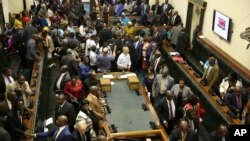The Zimbabwe Constitutional Amendment Bill (Number 2), which scraps the running mate in the supreme law and gives the president power to appoint judges, sailed through Senate today.
Sixty-five senators, including at least five from the opposition Movement for Democratic Change, voted for the Bill that was opposed by 10 legislators.
Justice Minister Ziyambi Ziyambi described the passage of the bill as “historic” while critics and some lawmakers called it a disastrous moment for Zimbabwe.
According to the Senate Hansard, he said, “… Historic in the sense that we debated, we came together and voted for a national cause. Historic in that we also were not fixated by the fact that we did a good job in 2013 but we also noticed some errors in that particular Constitution that did not allow us to come up with appropriate legislation in terms of our devolution agenda.
“It now paves the way for us to properly come up with legislation that will give effect to our devolution agenda and this is most welcome. It will ensure that our developmental strategy, our vision 2030 as enunciated by our president, will be realised across the regions. I am also very elated in that we now can plan for the 2023 elections knowing pretty sure that we have the women’s quota and the youth’s quota. We have a year and a half to go to the elections and we needed finality in this regard. I am very happy that we can now prepare both as political parties and as Government towards those elections.”
The Bill seeks to remove a clause on running mates, empower the president to appoint and extend tenure of judges beyond 70 years and extend the women’s quota.
In a statement, MDC-T information secretary, Witness Dube, said mostly women senators in the MDC-T voted for the Bill “naturally because of the clauses which guarantee women quotas both in parliament an in local government.”
Dube further said, “As the MDC-T we debated vigorously, and fought valiantly to oppose this bill primarily because of the running-mate and the chief justice clauses. Whilst we understand how difficult it was for women in the MDC-T to have been conflicted between the age old position of the party and their desire to make gains in the women's movement, we are disappointed by male senators who may have absconded from the vote without giving any reasons. As a party we believe that the strength of our democracy is not only in the expression of our diversity through any vote, but moreso the courage to always partake in such polls in order to express our divergent views.”
He said it is, however, encouraging to note that the MDC-T won the debates on merit in both houses, only to lose to a Zanu PF super majority attained in the 2018 elections.
“… We urge our members to continue working closely with their public representatives to ensure that future amendments are given due attention in their early stages in the lower house in order “to avoid omnibus bills which present a voting dilemma, as noted with the Constitutional Amendment Number 2 Bill.”
In its analysis, Kubatana.com says If adopted in its current form, the proposed legislation would, among other changes, amend the Constitution to give the president unchecked authority to fill the seats of the three most senior judges in the country. In making the appointments, while the president would be required to consult the Judicial Services Commission, he would not be required to accept any of the body’s recommendations.
Similarly, says Kubatana.com in an analysis posted on its website, while the president must inform the Senate if his decision is not consistent with the recommendation of the JSC, the Senate would not have the authority to block or change, or force him to change, his decision.
“The proposed legislation makes it unequivocally clear that the President would enjoy absolute authority, stating that the Chief Justice, the Deputy Chief Justice, and the Judge President of the High Court and all other judges are appointed by the president in accordance with this section. The Chief Justice, the Deputy Chief Justice, and the Judge President of the High Court shall be appointed by the president after consultation with the Judicial Service Commission.
The Zimbabwe Constitution currently stipulates that the nomination and appointment process of judges be conducted in a public and transparent manner. All judges are appointed by the president from a list of candidates provided by the Judicial Service Commission.




